|
|
Information
Service of
the Serbian Orthodox Church
April 9, 2004

PASCHAL
GREETINGS FROM THE INFORMATION SERVICE
OF THE SERBIAN ORTHODOX CHURCH
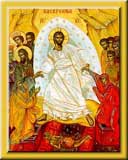 To
all Orthodox faithful, to the visitors of our Internet site and
those who make use of the Information Service of the Serbian Orthodox
Church, we greet you on this most joyful Christian feast of the
Resurrection of our Lord, with faith and anticipation for the
resurrection of the whole world from these days of temptation. To
all Orthodox faithful, to the visitors of our Internet site and
those who make use of the Information Service of the Serbian Orthodox
Church, we greet you on this most joyful Christian feast of the
Resurrection of our Lord, with faith and anticipation for the
resurrection of the whole world from these days of temptation.
May the Paschal holidays be to everyone for their salvation and
spiritual growth, so that we may in Christian love, ourselves
witness the Risen Lord Jesus Christ.
CHRIST IS RISEN!
INDEED HE IS RISEN!

TESTIMONY
OF VITORKA STAROVLAH,
WIFE OF FATHER JEREMIJA
Zvornik, April 6, 2004
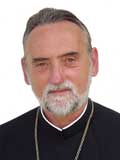 During
the night between Wednesday, March 31 and Thursday, April 1, 2004
at approximately 01,00 o'clock after midnight we were awoken by
the ringing of the telephone, which frightened us, since no one
calls us at that time of the night. Because our younger son was
away on a trip, I immediately grew concerned that something might
have happened to him and so I awoke my husband, who was sound
asleep. He headed toward the telephone, which is located in the
living room. I heard some kind of stirring about during those
moments but I could not identify since I had just been awoken.
Perhaps
it was some noise from outside, perhaps the sound of helicopters
or vehicles, I cannot say for sure. During
the night between Wednesday, March 31 and Thursday, April 1, 2004
at approximately 01,00 o'clock after midnight we were awoken by
the ringing of the telephone, which frightened us, since no one
calls us at that time of the night. Because our younger son was
away on a trip, I immediately grew concerned that something might
have happened to him and so I awoke my husband, who was sound
asleep. He headed toward the telephone, which is located in the
living room. I heard some kind of stirring about during those
moments but I could not identify since I had just been awoken.
Perhaps
it was some noise from outside, perhaps the sound of helicopters
or vehicles, I cannot say for sure. 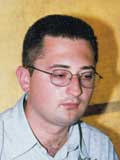 As
Aco (Atzo, diminutive of Aleksandar) and I stood in the hallway,
we heard a powerful blast and there were lights all around us
and some gunshots could also be heard. I told Aleksandar to take
shelter. I heard Jeremija (Jeremiah) saying to someone from the
kitchen: "We will open the door for you! Why are you doing
this!" When I saw a soldier crossing Aleksandar's room toward
us, I momentarily ducked into the bedroom. A soldier wearing a
dark green uniform forced his way in after me, slammed the door
and with a gun pointed at me said: "Sit down!" (in English).
Immediately
afterward terrible yelling and shouting by the soldiers could
be heard and at almost the same time Jeremiah's loud cries. I
did not hear my son. Jeremija's cries were painful and terrible
and he said: "Let me go! What are you doing to me!"
But they continued shouting at him. At
times Jeremija sobbed softly and then his cries and screams would
grow louder. And he begged them. I could not bear to listen to
Jeremija's cries, they were tearing me apart and so I turned toward
the soldier who once again shouted: "Sit down!" (in
English) Another soldier wearing the same uniform half-opened
the bedroom door and glanced toward me. As I was kneeling in front
of the soldier begging him to allow me to see my husband, when
I looked I saw next to his feet the motionless head of my son
on the hall floor. I then begged and entreated through tears that
they let me go or kill me. During this entire time Jeremija was
weeping and screaming at them to let him go. At one point the
soldier, having apparently grown tired, put his boot on the bed
and, keeping the gun pointed at me, stared at the ceiling, paying
no attention at all to my entreaties. At one point I heard the
sound of a device that reminded me of an electroshock device.
First I heard a flat sound and then interrupted sounds on the
basis of which I concluded that they were trying to reanimate
Aco. Then I heard the sound of a helicopter and I begged God that
they would transfer them to the hospital as quickly as possible.
Jeremija's cries did not stop. I could still hear him when they
took him out. The alarm clock in the bedroom gave the time as
2,15. As
Aco (Atzo, diminutive of Aleksandar) and I stood in the hallway,
we heard a powerful blast and there were lights all around us
and some gunshots could also be heard. I told Aleksandar to take
shelter. I heard Jeremija (Jeremiah) saying to someone from the
kitchen: "We will open the door for you! Why are you doing
this!" When I saw a soldier crossing Aleksandar's room toward
us, I momentarily ducked into the bedroom. A soldier wearing a
dark green uniform forced his way in after me, slammed the door
and with a gun pointed at me said: "Sit down!" (in English).
Immediately
afterward terrible yelling and shouting by the soldiers could
be heard and at almost the same time Jeremiah's loud cries. I
did not hear my son. Jeremija's cries were painful and terrible
and he said: "Let me go! What are you doing to me!"
But they continued shouting at him. At
times Jeremija sobbed softly and then his cries and screams would
grow louder. And he begged them. I could not bear to listen to
Jeremija's cries, they were tearing me apart and so I turned toward
the soldier who once again shouted: "Sit down!" (in
English) Another soldier wearing the same uniform half-opened
the bedroom door and glanced toward me. As I was kneeling in front
of the soldier begging him to allow me to see my husband, when
I looked I saw next to his feet the motionless head of my son
on the hall floor. I then begged and entreated through tears that
they let me go or kill me. During this entire time Jeremija was
weeping and screaming at them to let him go. At one point the
soldier, having apparently grown tired, put his boot on the bed
and, keeping the gun pointed at me, stared at the ceiling, paying
no attention at all to my entreaties. At one point I heard the
sound of a device that reminded me of an electroshock device.
First I heard a flat sound and then interrupted sounds on the
basis of which I concluded that they were trying to reanimate
Aco. Then I heard the sound of a helicopter and I begged God that
they would transfer them to the hospital as quickly as possible.
Jeremija's cries did not stop. I could still hear him when they
took him out. The alarm clock in the bedroom gave the time as
2,15.
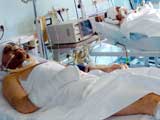 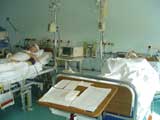
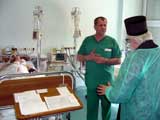 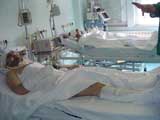
Father
Jeremija Starovlah and his son Aleksandar are receiving treatment
in Tuzla Hospital for injuries inflicted by SFOR (photo down left
shows Metropolitan Nikolaj who visited the wounded priest and
his son at the hospital) click to enlarge
When
the sound of the helicopter grew more distant, an armed soldier
in a camouflage uniform stepped in. I do not remember what he
said to me but I concluded that he was speaking in a language
like Serbian. I begged him to tell me why they had tortured my
husband and killed my son. I also asked him whether he had a mother
and what did he think her reaction would be if she saw her motionless
son lying on the floor while a foreign soldier refused to allow
her to see him. He did not respond; he just shrugged his shoulders
and said something like: "We no shoot" (in Serbian).
I answered: "What did you use to kill them, then?" He
then asked me who was living in my house and he told me to write
down all the names and ages. Although my hands were shaking I
quickly did as he asked, thinking that it was something they urgently
needed to take care of them. He asked something like: "Who
this to you?" (in Serbian) and, pointing to the names, "Who
this, and who this?" I answered that these were my husband
and son and I pointed to my name, too. I asked him where they
had taken them and if they were alive. He answered that they had
been taken to Sarajevo Hospital and that they were alive, and
that in two hours he would come to get me so I could go and see
them for myself. Then the soldier left with the others and a woman
came in in a camouflage uniform with a man who introduced himself
as the translator. I was still kneeling in the bedroom at the
foot of the bed and, clutching a cross and a prayer book, I was
praying to God. The translator asked me how I was. I cried and
said: "My son is dead! Why did they kill him when he wouldn't
hurt a fly!" I don't know why but I did not ask about my
husband at that point. Probably because I had heard his cries
and thus I hoped that he would still be alive. This girl kept
repeating: "I'm sorry, I'm sorry" (in English) and it
seemed to me that she really was sorry. Kneeling beside me, she
took her own prayer book from her back pack and some sort of talisman,
a small icon or a cross - I'm not sure what it was - and she prayed
with me. Shortly afterward I hurried to the iconostasis in the
living room. She followed me. I tried to light the icon lamp but
my hands were shaking so much it was impossible to do so. Then
she took a match and lit the icon lamp. Then I censed the icons
in the house and prayed in front of the icon of Our Lord, the
icon of the Most Holy Mother of God, in front of the icon of St.
Nicholas, our patron saint and in front of St. Sava. The girl
stood in front of the icons with me for a time, then she asked
if she should stay with me some more or if I wished to call any
friends. I answered that I did not need anyone right now and that
I wanted to be alone with God in prayer for my son and husband.
She left but first the translator told me that "my"
police would be coming soon to prepare a report. After that I
was alone and, with a cross in my hand, I headed down the hall.
In the corner on the left side between a small lavatory and the
kitchen, I found a pool of blood. I bent over and saw there were
also tufts of hair. I knew that Jeremija had been slammed into
that corner. The walls were splattered with blood all around.
Between the wall and the wardrobe in the hall next to Aco's room
one could see he had been crushed there. I also saw some sort
of masks and some tubes. All covered in blood. The surrounding
walls were the same. The house was destroyed. With a feeling of
despair and helplessness I heard the hysterical laughter of some
soldiers who were still standing in the hallway of the building.
When I heard them I began to despise them. But I quickly recovered
and begged God to expel all the hate from my heart lest He withhold
His mercy toward Jeremija and Aco. I said, may God forgive them
for they know not what they are doing. Then I telephoned my younger
son who was abroad on a business trip. I told him that something
terrible had happened and that he had to return right away. I
explained what had happened and he asked several times: "But
why, mother?" I answered that I did not know. Shortly afterwards
I no longer could hear the soldiers but two men entered the house,
that is, the bedroom, one of them in a police uniform and the
other in plain clothes. It was between 4,30 and 5,00. The one
in plain clothes introduced himself but I cannot remember how.
He asked me if we had offered any resistance. Shocked by his question,
I replied: "What resistance? We were awoken from our sleep,
in our pajamas." They told me the police would now come to
secure the location and prepare a report. At about 5,00 o'clock
I called the monastery of Dobrun. Father Mihajlo answered the
phone; I explained what had happened to him and I asked the brotherhood
to pray. I was looking at the clock and waiting for the soldier
to come back and take me to see Jeremija and Aleksandar. He
did not appear; at about 6,30 the telephone rang. It was a man
by the name of Mithat or something like that - I am not sure -
who also told me the name of the news agency he worked for. The
call was from Sarajevo. I concluded that from the fact that even
on the fixed phone the caller's number was displayed. He asked
me if I had been contacted by SFOR and whether I knew where my
son and husband were. I answered that I did not know but that
a soldier had told me that they had been transferred to Sarajevo
and that I was waiting for him to take me there. Then the man
told me that he had called SFOR and that he had asked them whether
they had informed the family; the response that he got from the
other side was: "Sure, sure, we'll inform them." And
he also told me that he had found out that they were in Tuzla
Hospital, that they were alive and he gave me the telephone number
of the hospital. I was grateful to him for that. He asked me whether
I also had a daughter. I answered: "No, I have another son."
"It's good that he wasn't there," the man said. "He
could have gone through the same thing." I called the hospital
and introduced myself. Then one of the physicians told me they
had received some seriously injured persons in critical condition
but that they had no idea who they were. He told me that SFOR
forces had brought them at about 3,00 o'clock and dumped them
in the hospital like sacks. When asked by the physician who the
two men were, the soldiers replied: "John Doe 1" and
"John Doe 2". He also told me that they had thought
that there had been a serious traffic accident and that the information
I gave them was the first they had heard about them.
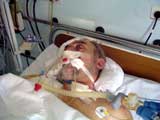 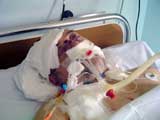
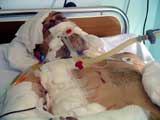
Father Jeremija Starovlah in Tuzla Hospital because of SFOR's brutality
click to enlarge
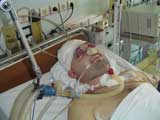 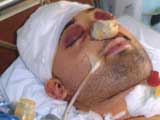
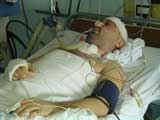 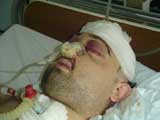
Aleksandar
Starovlah, Father Jeremija's son, presently in Tuzla Hospital
next to his father because of SFOR's brutality
click to enlarge
I was informed that their admission had been video taped and that
the tapes are stored in the office for public relations of the
University Clinical Center in Tuzla.
Our
Metropolitan Nikolai had arrived in the courtyard of our church
by about 5,00 but he was not allowed to enter our home because
of the police investigation.
Vitorka Starovlah

"A GIFT FOR CHILANDAR"
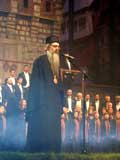 On April 13, 2004 or Bright Tuesday a fundraising concert entitled "A Gift for Chilandar" was held in Belgrade's Sava Center. The concert was organized by the Holy Synod of Bishops of the Serbian Orthodox Church and the Information Service of the Serbian Orthodox Church with the blessing of His Beatitude the Serbian Patriarch Kyr Pavle. On April 13, 2004 or Bright Tuesday a fundraising concert entitled "A Gift for Chilandar" was held in Belgrade's Sava Center. The concert was organized by the Holy Synod of Bishops of the Serbian Orthodox Church and the Information Service of the Serbian Orthodox Church with the blessing of His Beatitude the Serbian Patriarch Kyr Pavle.
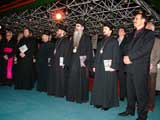 The event began in the lobby of the Sava Center at 7:30 p.m. with the opening of two exhibitions: photographs of Chilandar Monastery before and after the fire by photographer Rajko Karisic and Chilandar manuscripts. The exhibition was opened by the Deputy Minister of Religions, Ms. Nevena Vitosevic. Kindergarten children from Belgrade's Vracar quarter then turned in their monetary contributions for Chilandar Monastery and the victims in Kosovo and Metohija to His Grace Bishop Jovan of Sumadija. The little ones then performed an series of recitals about St. Sava which was greeted with enthusiasm by the audience. The event began in the lobby of the Sava Center at 7:30 p.m. with the opening of two exhibitions: photographs of Chilandar Monastery before and after the fire by photographer Rajko Karisic and Chilandar manuscripts. The exhibition was opened by the Deputy Minister of Religions, Ms. Nevena Vitosevic. Kindergarten children from Belgrade's Vracar quarter then turned in their monetary contributions for Chilandar Monastery and the victims in Kosovo and Metohija to His Grace Bishop Jovan of Sumadija. The little ones then performed an series of recitals about St. Sava which was greeted with enthusiasm by the audience.
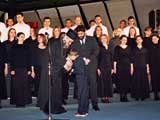 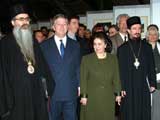
All guests then moved into the great hall. This fundraising concert event was received with great interest. Among those present at the Sava Center that evening were members of the Serbian Orthodox Church: His Grace Bishop Irinej of Backa, His Grace Bishop Jovan of Sumadija, His Grace Bishop Ignjatije of Branicevo, His Grace Bishop Atanasije of Hvosno and a number of priests and deacons. The concert was also attended by representatives of the Roman Catholic Church. A number of distinguished guests honored the event by their presence, notably HRH Crown Prince Aleksandar Karadjordjevic and HRH Princess Katarina; General-Colonel Branko Krga, the Chief of Staff, and representatives of the Serbia-Montenegro Armed Forces; on behalf of the Prime Minister of the Republic of Serbia, Mr. Slobodan Samardzic; the Republic of Serbia's Minister of Religions, Mr. Milan Radulovic; as well as U.S. Congresswoman Corinne Brown of Jacksonville, Florida. Also in attendance were representatives of the Ministries of Culture, Capital Investments, Foreign Economic Relations and Internal Affairs. Among the other distinguished guests was Mr. Darko Bajcetic, the director of the general sponsor of the concert, the DONKAFE company, as well as representatives of the Novi Sad and Belgrade International Fairs, ELTIM, Bambi of Pozarevac, the ZTP Health Institute, Jubmes Bank, Atlas Bank, Kula Bank, Meridijan Bank, Eksim Bank, Politika corporation, Gemaks and the municipal assembly of the Belgrade quarter Stari Grad.
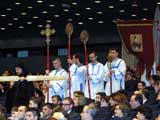 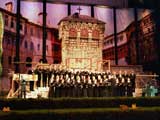
The program began at 8:00 p.m. A large scene, perhaps the largest ever in the Sava Center, opened the doors of Chilandar Monastery to all guests. Chilandar's St. Sava Tower, the courtyard and the cypresses conveyed a realistic impression of the medieval Serbian holy shrine.
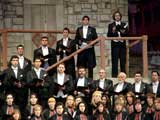 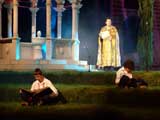
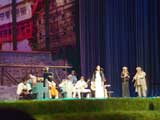 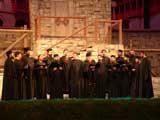
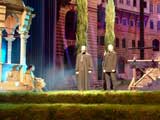 The introductory remarks were made by His Grace Bishop Irinej of Backa, who emphasized the importance of Chilandar Monastery not only for the Serbs but for the entire Orthodox Christian world. Although formally under the jurisdiction of the Ecumenical Patriarchate of Constantinople, the monastery has always been Serb. Bishop Irinej emphasized that the monks in Chilandar Monastery pray to the Lord and to the Three-Handed Theotokos (Mother of God - the monastery's crowning icon) for all Serbs. The introductory remarks were made by His Grace Bishop Irinej of Backa, who emphasized the importance of Chilandar Monastery not only for the Serbs but for the entire Orthodox Christian world. Although formally under the jurisdiction of the Ecumenical Patriarchate of Constantinople, the monastery has always been Serb. Bishop Irinej emphasized that the monks in Chilandar Monastery pray to the Lord and to the Three-Handed Theotokos (Mother of God - the monastery's crowning icon) for all Serbs.
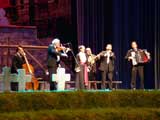 It is with representative prayers before the Lord that the concert began. "Thy Resurrection" was performed by the choir of the First Belgrade Singing Society directed by Svetlana Vilic. This Paschal song was followed by "A Short Hymn to St. Sava" sung by the same choir joined by bass-baritone Aleksandar Novakovic and ending with a rendition by the oldest Serbian choir of "The Mother of God" by Pavel Chesnokov. It is with representative prayers before the Lord that the concert began. "Thy Resurrection" was performed by the choir of the First Belgrade Singing Society directed by Svetlana Vilic. This Paschal song was followed by "A Short Hymn to St. Sava" sung by the same choir joined by bass-baritone Aleksandar Novakovic and ending with a rendition by the oldest Serbian choir of "The Mother of God" by Pavel Chesnokov.
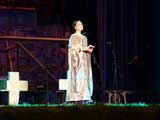 Theater actor Nebojsa Dugalic then recited the "Prayer of Prince Rastko" (St. Sava prior to his monastic vows). The groups Jokulatores Slavensis and Ziva Voda sang "At Your Feet", according to a text by the Holy Bishop Nikolai of Zica and Ochrid. In a joint performance, the choir of the monastery Kovilja and the Mojsije Petrovic Serbian-Byzantine choir directed by Nikola Popmihajlov sang "Katavasias" and the duet Pirg then sang "The Land of St. Sava". Theater actor Nebojsa Dugalic then recited the "Prayer of Prince Rastko" (St. Sava prior to his monastic vows). The groups Jokulatores Slavensis and Ziva Voda sang "At Your Feet", according to a text by the Holy Bishop Nikolai of Zica and Ochrid. In a joint performance, the choir of the monastery Kovilja and the Mojsije Petrovic Serbian-Byzantine choir directed by Nikola Popmihajlov sang "Katavasias" and the duet Pirg then sang "The Land of St. Sava". 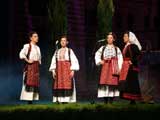 This was followed by an enactment of the founding of the Imperial Laura of Chilandar Monastery with Nebojsa Dugalic in the role of St. Sava, Branko Djuric as St. Simeon and Nebojsa Kundacina as Emperor Alexei III Komnin. This relatively brief spot succinctly and realistically portrayed Emperor Alexei giving Sava and Simeon his permission to build the monastery - and his imperial staff to signify that the abbot of the monastery was evermore to be appointed by the Emperor himself. Flutist Bora Dugic and the Prijatelji ensemble then performed the instrumental composition "The Moment". Actor Branko Djuric recited the "Petition of St. Simeon", emphasizing that when a man builds a house it is for his descendants, whereas when he builds a Church, it is for all his people. The folk song "Kud se djede Car Nemanje blago" (Where is the treasure of Emperor Nemanja) was performed by Danilo Lazovic and gusle player and folk singer Bosko Vu1acic. This was followed by an enactment of the founding of the Imperial Laura of Chilandar Monastery with Nebojsa Dugalic in the role of St. Sava, Branko Djuric as St. Simeon and Nebojsa Kundacina as Emperor Alexei III Komnin. This relatively brief spot succinctly and realistically portrayed Emperor Alexei giving Sava and Simeon his permission to build the monastery - and his imperial staff to signify that the abbot of the monastery was evermore to be appointed by the Emperor himself. Flutist Bora Dugic and the Prijatelji ensemble then performed the instrumental composition "The Moment". Actor Branko Djuric recited the "Petition of St. Simeon", emphasizing that when a man builds a house it is for his descendants, whereas when he builds a Church, it is for all his people. The folk song "Kud se djede Car Nemanje blago" (Where is the treasure of Emperor Nemanja) was performed by Danilo Lazovic and gusle player and folk singer Bosko Vu1acic. 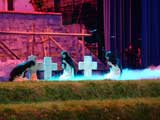 The Kosovo part of the concert began with the performance of part of the drama "The Battle of Kosovo" by Ljubomir Simovic with Sonja Kolacaric as Princess Milica and Slobodan Custic as Prince Lazar. As part of this segment, the group Belo Platno performed "Gusta mi magla padnala na Kosovo" (A thick fog has fallen on Kosovo) and Svetlana Stevic sang "Knjigu pise turski care" (The Turkish emperor writes his book), a song from Kosovo. Svetlana Spasic then sang an old folk song, "Nizu se zvezde niz vedro nebo" (The stars appear in the clear sky). Slobodan Custic recited the poem "Defenders of the Soul". The song "Blessed Is the Husband" by Pavel Chesnokov was sung by the St. George Choir of the Novi Sad Orthodox Cathedral with the assistance of baritone Vasa Stojkic under the direction of Bogdan Djakovic. Sonja Kolacaric then recited "The Moment of Ravanica" while at the same time Biljana Krstic and the group Bistrik performed the song "Od pola idet babo" (Father comes from the field). Jelena Zigon recited a moving poem about the leaders of the Great Migrations of the Serbs, "Carnojevici". At the same time, some 30 people acting the role of a large group of refugee women, children and old people circled three times around the stage and the audience; symbolically, this can be interpreted as a religious procession around a church, i.e., Chilandar Monastery. The refugee group also reminded the public of the difficult periods that the Serbian people have endured throughout in their history. The Kosovo part of the concert began with the performance of part of the drama "The Battle of Kosovo" by Ljubomir Simovic with Sonja Kolacaric as Princess Milica and Slobodan Custic as Prince Lazar. As part of this segment, the group Belo Platno performed "Gusta mi magla padnala na Kosovo" (A thick fog has fallen on Kosovo) and Svetlana Stevic sang "Knjigu pise turski care" (The Turkish emperor writes his book), a song from Kosovo. Svetlana Spasic then sang an old folk song, "Nizu se zvezde niz vedro nebo" (The stars appear in the clear sky). Slobodan Custic recited the poem "Defenders of the Soul". The song "Blessed Is the Husband" by Pavel Chesnokov was sung by the St. George Choir of the Novi Sad Orthodox Cathedral with the assistance of baritone Vasa Stojkic under the direction of Bogdan Djakovic. Sonja Kolacaric then recited "The Moment of Ravanica" while at the same time Biljana Krstic and the group Bistrik performed the song "Od pola idet babo" (Father comes from the field). Jelena Zigon recited a moving poem about the leaders of the Great Migrations of the Serbs, "Carnojevici". At the same time, some 30 people acting the role of a large group of refugee women, children and old people circled three times around the stage and the audience; symbolically, this can be interpreted as a religious procession around a church, i.e., Chilandar Monastery. The refugee group also reminded the public of the difficult periods that the Serbian people have endured throughout in their history.
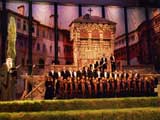 This was followed by the Belgrade Chamber Choir with soprano Marina Trajkovic directed by Vladimir Markovic singing the "Prayer of David". Young theater actress Milica Gutovic then recited "The Tribe of the Carnojevices". The performance continued with the performance of "Manasija" by the group Legende from a new sound distributor dedicated to spiritual music. This was followed by the Belgrade Chamber Choir with soprano Marina Trajkovic directed by Vladimir Markovic singing the "Prayer of David". Young theater actress Milica Gutovic then recited "The Tribe of the Carnojevices". The performance continued with the performance of "Manasija" by the group Legende from a new sound distributor dedicated to spiritual music. 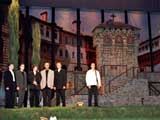 Slobodan Boda Ninkovic recited the "Homily on the Resurrection" of the Holy Bishop Nikolai. The group Moba performed the folk song "Kisa pada, trava raste" (The rain falls, the grass grows) and the group Teodulija played the instrumental "Battle". Danilo Lazovic then recited the "Prayerful Appeal" while director Jelena Jez brought out the Rastko and Stefan Children's Choir from the Orthodox Cathedral of St. Sava, which sang "The Lord Is Risen". Slobodan Trkulja and his international group Balkanopolis played a folk song called " My beautiful dark eyes". Branislav Zeremski then recited St. Nektarios of Elgin "On Virtue". Slobodan Boda Ninkovic recited the "Homily on the Resurrection" of the Holy Bishop Nikolai. The group Moba performed the folk song "Kisa pada, trava raste" (The rain falls, the grass grows) and the group Teodulija played the instrumental "Battle". Danilo Lazovic then recited the "Prayerful Appeal" while director Jelena Jez brought out the Rastko and Stefan Children's Choir from the Orthodox Cathedral of St. Sava, which sang "The Lord Is Risen". Slobodan Trkulja and his international group Balkanopolis played a folk song called " My beautiful dark eyes". Branislav Zeremski then recited St. Nektarios of Elgin "On Virtue". 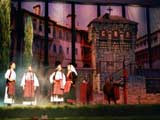 The Kolegijum Muzikum Academic Choir directed by Dragan Jovanovic sang a liturgical song from the 17th century celebrating God called "Polielei". The poem "The Three-Handed Mother of God" was recited by Vjera Mujovic while a grand procession of young children in folk costumes carried reproductions of the miracle-working Chilandar icon of that name across the stage and into the audience. The Kolegijum Muzikum Academic Choir directed by Dragan Jovanovic sang a liturgical song from the 17th century celebrating God called "Polielei". The poem "The Three-Handed Mother of God" was recited by Vjera Mujovic while a grand procession of young children in folk costumes carried reproductions of the miracle-working Chilandar icon of that name across the stage and into the audience. 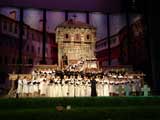 The Obilic Academic Choir performed the liturgical song " O Virgin Theotokos" under the direction of Darinka Matic-Marovic and assistant Ivona Eklemovic. The final recital was by Petar Bozovic, who reminded the Serbs of the Resurrection of the Lord and the resurrection of Serb spirituality. The spoken fugue "Serbia" by Aleksandra S. Vujic was performed by the Kolegi1um Muzikum and Obilic Academic Choirs under the direction of Darinka Matic-Marovic and assistant Ivona Eklemovic. Simultaneously the choir recited the names of cities in Serbia and Montenegro and names of monasteries and churches torched and destroyed during the recent pogrom against the Serbs in Kosovo and Metohija. A group of singers, among them well-known actors, singers and musicians, performed the song "Let the nations rejoice, let the people hear" as arranged by Divna Ljubojevic and Ljuba Dimitrijevic. All group scenes were performed by the Lola Academic Cultural Artistic Society, members of the Lujo Davico School of Ballet and members of the St. Justin the Philosopher Student Association. Choreography was arranged by Velimir Agovski and assistant Jovana Mihajlovic. The Obilic Academic Choir performed the liturgical song " O Virgin Theotokos" under the direction of Darinka Matic-Marovic and assistant Ivona Eklemovic. The final recital was by Petar Bozovic, who reminded the Serbs of the Resurrection of the Lord and the resurrection of Serb spirituality. The spoken fugue "Serbia" by Aleksandra S. Vujic was performed by the Kolegi1um Muzikum and Obilic Academic Choirs under the direction of Darinka Matic-Marovic and assistant Ivona Eklemovic. Simultaneously the choir recited the names of cities in Serbia and Montenegro and names of monasteries and churches torched and destroyed during the recent pogrom against the Serbs in Kosovo and Metohija. A group of singers, among them well-known actors, singers and musicians, performed the song "Let the nations rejoice, let the people hear" as arranged by Divna Ljubojevic and Ljuba Dimitrijevic. All group scenes were performed by the Lola Academic Cultural Artistic Society, members of the Lujo Davico School of Ballet and members of the St. Justin the Philosopher Student Association. Choreography was arranged by Velimir Agovski and assistant Jovana Mihajlovic.
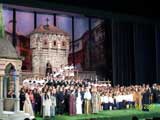 This concert, which consisted of three program themes - Chilandar, Kosovo and Pascha -is only one in a series of fundraising events to be organized by the Information Service of the Serbian Orthodox Church toward the Chilandar Monastery so it can once again succor the Serbs during their trials and bring redemption through representative prayers before the Three-Handed Theotokos and Our Resurrected Lord Jesus Christ. This concert, which consisted of three program themes - Chilandar, Kosovo and Pascha -is only one in a series of fundraising events to be organized by the Information Service of the Serbian Orthodox Church toward the Chilandar Monastery so it can once again succor the Serbs during their trials and bring redemption through representative prayers before the Three-Handed Theotokos and Our Resurrected Lord Jesus Christ.

REQUIEM FOR VICTIMS OF ALLIED BOMBING OF 1944
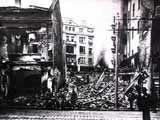 On Friday, April 16, 2004 at 12:00 noon a requiem service will be served in the church of St. Mark in Belgrade for victims of the Allied bombing on Easter 1944 (April 16-17). On Friday, April 16, 2004 at 12:00 noon a requiem service will be served in the church of St. Mark in Belgrade for victims of the Allied bombing on Easter 1944 (April 16-17).

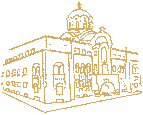
Copyright © 1999-2004 by
The Information Service of
the Serbian Orthodox Church
11000 Belgrade
Kralja Petra I no.5
+381 11 3282 596
e-mail
|

